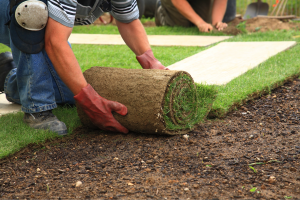Tips for Community Associations and Homeowners’ Associations Entering Contracts for Landscaping Maintenance and Repairs to Structures
By Leigh Kellett Fletcher |

As communities mature, the landscaping and buildings owned and maintained by nonprofit community associations and homeowners’ associations require professional help to retain their appearance and value. For volunteer board members, contracting for that work can be nerve wracking because the dollars involved can be large and the process confusing. If your association is professionally managed, the management company may do the legwork for you and bring proposals to the board for consideration. If your association is self-managed, the burden of seeking proposals will be an additional board responsibility. The bad news is, disputes with contractors can be costly and associations can wrack up attorneys’ fees to resolve them. To avoid that outcome, here are some tips to help board members execute their responsibilities related to contracts for large projects:
- Before bids/proposals are sought, make sure the Board has clearly identified its expectations for the work to be performed. For example, is the board asking for the landscaping to be maintained in its current state, or is the board expecting substantial replanting or redesign of the landscaping? Is irrigation work to be included? Are all landscaped areas included, or only specific areas? Will this contractor be expected to perform long-term maintenance or only a specific project?
- If your community is newer, or if developer turnover has happened recently, confirm whether any of the required work is covered by a warranty from the original installer/contractor. If so, seek the repair (at no cost) from the business that provided the warranty. If the repair is required as a result of storm damage or other incidents covered by insurance, check to see if insurance coverage will pay for the repair.
- Look at the association budget. Try to scope the requested work to match the available budget.
- Try to obtain multiple bids/proposals so that the board has options to consider. Each Bid or proposal should describe the scope of the work, the price, the timeline to complete, and any excluded costs not include in the proposal price. For large projects, most contractors will come to a board meeting to answer board questions as part of the selection process.
- Seek bids/proposals only from licensed individuals. Contractors should be able to provide proof of liability insurance, worker’s compensation coverage, a local business license, a contractor’s license, and unemployment coverage.
- For big projects with multiple specialties involved, consider hiring a licensed general contractor. The GC can sub work to plumbers, electricians etc.
- Before final payment, all work should be inspected by a competent individual to determine the work has been completed to meet code and commercial requirements. This person may be the association manager, a board member, or a third party.
- Request warranties for all structural work and landscaping plants and trees.
- Once a contractor is selected, enter into a written contract with the contractor confirming the terms of the proposal and remedies in case the work is not performed satisfactorily. Your association attorney should be consulted to review any contract prepared by a contractor or to prepare one on the Association’s behalf.
- Contracts should be approved by the Board before execution, unless the board has delegated execution authority to the manager.
Leigh Kellett Fletcher has been practicing land use, environmental and real estate law since 1997 and regularly represents clients acquiring, developing and selling real estate in Florida and the U. S. Virgin Islands. She has been involved in the purchase, sale and redevelopment of multi-family residential projects, office, commercial and mixed use properties and has worked with clients to obtain land use entitlements and environmental permits to develop and expand commercial development. She frequently works with clients acquiring environmentally contaminated properties and assists them with obtaining brownfield designations and completing remediation and development of those properties.
